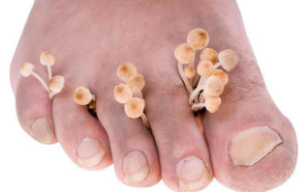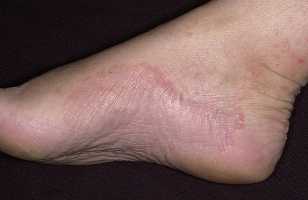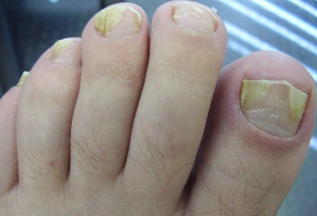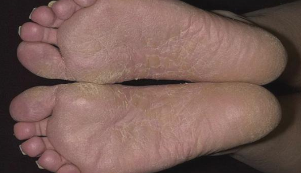One of the most common diseases of the feet is a foot fungus, or as it is called mycosis. According to statistics for medical research identified several types of these lesions of the skin and nail plate.

The main thing with the appearance of the fungus immediately consult a doctor to be able to protect your body from bacteria and everyone around you.
Looks like a foot fungus
Many have heard that there is such a disease, as a fungal infection, and it manifests itself in almost 80% of the population, but rarely has anyone faced with this problem live. There are cases that the infected are just not recognizing the significance of symptoms, does not know when to begin treatment, which leads to disastrous consequences. But in addition to the infected organism, can suffer the people around him.
To examine in more detail the stage of localization of bacteria on a human foot, you can use pictures, but keep in mind that in addition to visual effects, have symptoms that also vary in degree of infestation of the body.
The initial phase of the foot fungus will leak not very noticeable, but the feeling of itching, burning and small pockets of redness may indicate that the fungus started its activity.
The next phase is more serious and concerns she has of the foot and the nail plate. The nail begins to evolve (to turn yellow, become thicker). Also, the nails can be a slight white stripes and spots, which usually is already a serious reason to consult a doctor for diagnosis.

The last phase is a strong peeling of the skin, the nail slowly begins to move away from the hole, can cause sores and ulcers. All this leads to the complete destruction of the upper layer of the epidermis, the internal cracks are starting to strip.
So it looks like the athlete's foot at each stage of development. And as you can see from the photo, the consequences can be sad, subsequently, the defeat of by a fungus of nail plates and feet.
Fungus on toes
Fungal skin between the toes called athlete's foot, and the fungus — Tinea pedum. Generated by this fungus through contact with an already infected person or using someone else's hygiene.
Symptoms of the disease
- The skin between the toes becomes very dry and fragile, there are small scale;
- The appearance on the skin small pus bubbles with the liquid, and if one of them bursts, the skin an unpleasant feeling;
- Nail plate modified, the structure becomes more fragile;
- On socks and shoes can be unpleasant smell from the symptoms of fungus, it's pretty sharp and specific.
With the development of fungal bacteria, athlete's foot can occur in four phases:
- Mild phase. The first manifestations of flaking on the feet, it is necessary to go on consultation to the dermatologist. These are the first signs of fungus. Further development of the bacteria occurs at the level of the fingers, between the fingers and on the nails. The following symptoms — redness on the skin, small cracks on soles and heels, itching, and burning in place of a larger localization of the disease.
- Squamous hyperkeratotic. Squamous hyperkeratotic phase of the disease is due to a slight swelling of the skin of the feet, which also causes severe peeling of the skin of the feet and between the toes. Severe itching and a burning sensation spread over the entire area of the foot, capturing and nails. The color of the nail plate becomes from light yellow to a grayish hue, which entails the destruction of the upper layer of the plate. Hyperkeratotic phase of the fungus has the following symptoms: a rash on the skin of the foot that is from red to blue bubbles, which will later peel off much and deliver pain when walking. Turning to the doctor, the rash is cooperating and becoming one major source of infection. The entire process contributes to the unpleasant smell of feet.
- Intertriginosny phase is characterized by the appearance on the heels of deep cracks, which are accompanied by pain and the appearance of erosive ulcers. Pain significantly increased, which prevents people normally become foot.
- Skin phase is characterized by a small purulent vesicles, which are with great speed developing, covering just a few days the entire area of the foot and toes. Ulcers can self-open, thereby prompting the manifestations of the erosion of red. After the leather dries a bit, can stand a small amount of fluid from the sores.

Importantly, for the manifestation of the fungus on the feet, just to understand the symptoms and to promptly contact dermatologist. Symptoms of mold and visual inspection should give a certain picture of the process occurring on the legs. But we should not start self-treatment as this usually leads to inefficient consequences that creates more intense the location of the disease.
In order to prescribe the correct course of treatment, the doctor needs to know the phase of development of the fungus and identify the type of pathogen. But before that, the patient must be diagnosed, which subsequently will have a clear whole picture of the disease.
How to treat foot fungus
It should be remembered that depending on the phase of the disease will prescribed treatment that must necessarily be complex. Before you start treatment with topical agents, it is necessary to remove inflammatory processes and phenomena of keratinization.
In order to help get rid of unwanted fungal bacteria, you should know the correct procedures:
- For outdoor applications you should use creams, ointments, solutions, lacquers;
- Required course of medication antimycotic effects;
- With strong burning and itching, you should buy sedatives to relieve the pain symptoms;
- Since the immune system in the fight against fungus is weakened, you will need to drink a course of vitamins and minerals that will help the body to fight infection with more force;
- The manifestation of opportunistic diseases of an infectious nature, the dermatologist will prescribe a course of antibiotics.

To determine the specific drugs that a dermatologist should know the full picture of the course of fungal infection, be sure to take into account the age of the patient, the reaction of the fungus to other drugs, as well as the degree of contamination areas of the foot.
Most medical reference books can illustrate all phases of the occurrence of the fungus on the foot in a photo with a description of symptoms that the person was able to identify them. After visual inspection and comparison with photos of course of a fungal infection, the patient should immediately seek medical help from a specialist.
















